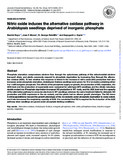Mostrar el registro sencillo del ítem
Nitric oxide induces the alternative oxidase pathway in Arabidopsis seedlings deprived of inorganic phosphate
| dc.creator | Royo Castillejo, Beatriz | es_ES |
| dc.creator | Morán Juez, José Fernando | es_ES |
| dc.creator | Ratcliffe, R. George | es_ES |
| dc.creator | Gupta, Kapuganti J. | es_ES |
| dc.date.accessioned | 2020-09-16T11:21:49Z | |
| dc.date.available | 2020-09-16T11:21:49Z | |
| dc.date.issued | 2015 | |
| dc.identifier.issn | 1460-2431 | |
| dc.identifier.uri | https://hdl.handle.net/2454/38133 | |
| dc.description.abstract | Phosphate starvation compromises electron flow through the cytochrome pathway of the mitochondrial electron transport chain, and plants commonly respond to phosphate deprivation by increasing flow through the alternative oxidase (AOX). To test whether this response is linked to the increase in nitric oxide (NO) production that also increases under phosphate starvation, Arabidopsis thaliana seedlings were grown for 15 d on media containing either 0 or 1mM inorganic phosphate. The effects of the phosphate supply on growth, the production of NO, respiration, the AOX level and the production of superoxide were compared for wild-type (WT) seedlings and the nitrate reductase double mutant nia. Phosphate deprivation increased NO production in WT roots, and the AOX level and the capacity of the alternative pathway to consume electrons in WT seedlings; whereas the same treatment failed to stimulate NO production and AOX expression in the nia mutant, and the plants had an altered growth phenotype. The NO donor S-nitrosoglutathione rescued the growth phenotype of the nia mutants under phosphate deprivation to some extent, and it also increased the respiratory capacity of AOX. It is concluded that NO is required for the induction of the AOX pathway when seedlings are grown under phosphate-limiting conditions. | en |
| dc.description.sponsorship | This work was supported by research grants (AGL2010-16167; AGL2014-52396-P) from the Spanish Ministry of Economy and Competitiveness (MINECO) to JFM, an FPI fellowship from MINECO (BR), and a Marie Curie Intra-European Fellowship for Career Development within the 7th European Community Framework Programme (KJG and RGR). | en |
| dc.format.extent | 8 p. | |
| dc.format.mimetype | application/pdf | en |
| dc.language.iso | eng | en |
| dc.publisher | Oxford University Press | en |
| dc.relation.ispartof | Journal of Experimental Botany, 2015, 66(20), 6273-6280 | en |
| dc.rights | © The Author 2015. This is an Open Access article distributed under the terms of the Creative Commons Attribution License, which permits unrestricted reuse, distribution, and reproduction in any medium, provided the original work is properly cited. | en |
| dc.rights.uri | http://creativecommons.org/licenses/by/3.0/ | |
| dc.subject | Alternative oxidase | en |
| dc.subject | Arabidopsis thaliana | en |
| dc.subject | Inorganic phosphate | en |
| dc.subject | Nitric oxide | en |
| dc.subject | Phosphate stress | en |
| dc.subject | Reactive oxygen species | en |
| dc.subject | Respiration | en |
| dc.title | Nitric oxide induces the alternative oxidase pathway in Arabidopsis seedlings deprived of inorganic phosphate | en |
| dc.type | info:eu-repo/semantics/article | en |
| dc.type | Artículo / Artikulua | es |
| dc.contributor.department | IdAB. Instituto de Agrobiotecnología / Agrobioteknologiako Institutua | es |
| dc.rights.accessRights | info:eu-repo/semantics/openAccess | en |
| dc.rights.accessRights | Acceso abierto / Sarbide irekia | es |
| dc.identifier.doi | 10.1093/jxb/erv338 | |
| dc.relation.projectID | info:eu-repo/grantAgreement/MINECO//AGL2014-52396-P/ES/ | en |
| dc.relation.publisherversion | https://doi.org/10.1093/jxb/erv338 | |
| dc.type.version | info:eu-repo/semantics/publishedVersion | en |
| dc.type.version | Versión publicada / Argitaratu den bertsioa | es |



